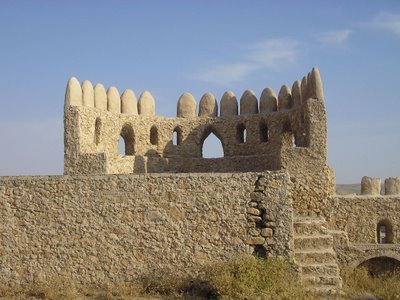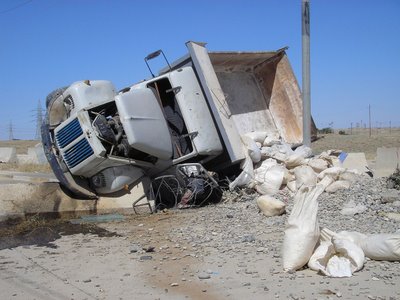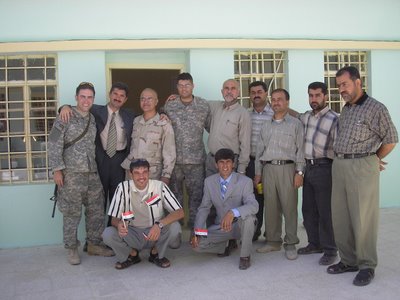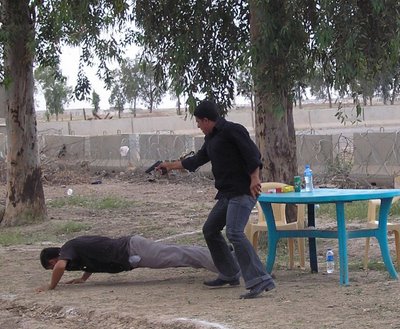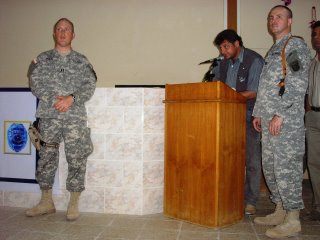A Balancing Act June 24, 2006
June 24, 2006
The relationship between the Iraqi soldiers and the American soldiers is obviously an important one if our efforts in Iraq are to succeed. It may seem impossible to imagine two such different groups coming together in a civilized manner. After all, they have been on opposite sides in the not so distant past. But nothing brings people together like common goals and common enemies.
All over Iraq, insurgents are targeting Coalition Forces and any Iraqi individuals or groups working with us, including the IA (Iraqi Army). In Kirkuk, the 101st Airborne Division has assembled groups of soldiers from different companies into Military Transition Teams, MiTT for short. I spent two days with the MiTT guys from the 2nd Battalion, who are helping to prepare the IA to take over as the military authority of the city, and the Medics, who are training Iraqi soldiers to respond to emergency medical situations. All of these guys have at least one IED (improvised explosive device) story, and shortly after we headed out to the IA military base, I had one too.
One of the Medics, Specialist Josh Goldberg, said he didn’t like the road we were driving on because it had seen its share of IEDs. Moments later, we heard a boom about one hundred meters behind our convoy. I watched a cloud of smoke rise from the site of the explosion, and Josh admitted he had a way of talking about things that seemed to make them happen. I asked him to talk less about IEDs and more about getting me a date.
Our convoy stopped to secure the area and monitor the situation, and the IP (Iraqi Police) and IA arrived moments later. The vehicles in our convoy had emerged unscathed, but a civilian had not been so lucky. The explosion had shattered the windows of his car and caused him to crash into an oncoming taxi. Shrapnel from the IED had punched a small hole in his skull and cut open his leg. The Medics, SPC Josh Goldberg, FSG Steve Smith and SSG Roger Copeland, grabbed their supplies and rushed to assist him. The extent of his pain and the depth of his suffering were overwhelming. Steve did his best to bandage the leg wound while Copeland and Josh treated the wound to his head. They did everything they could to stabilize the man and lessen his pain, completely focused on their patient, in spite of the fact that the scene was now crawling with police and curious onlookers. When the ambulance arrived, they made sure the ambulance crew knew the extent of his injuries and understood how to continue treatment. The taxi driver wandered the scene shaken but unharmed physically. Like us, he had been lucky, but it is hard to feel lucky after seeing another life destroyed.
The ambulance left, and a team trained in the investigation of explosive devices arrived, so we continued on our way to the IA base. The day had begun badly, but quickly improved when we arrived at our destination. I followed Josh and Steve into a room where they held classes in emergency first aid with a group of Iraqi soldiers. Some of the Iraqis had reached the point where they could teach the lessons to the next group of soldiers, and they had begun without us, which Steve found very encouraging. Josh had taken to heart my suggestion that he help find me a date, and throughout the morning’s lessons he pointed out men whom, regardless of the language barrier, he thought I might like to get to know.
There was obviously a bond between our Medics and the men they were training. They traded a lot of jokes. Sometimes the interpreter translated wisecracks back and forth. Sometimes gestures were enough. That soldiers can laugh together is a sign of camaraderie and caring. After the day’s lessons were completed, Steve asked the Iraqi soldiers who had led the classes if they had any questions or comments. The leader of the group, Thaer, put his hand on his heart and said he was very glad none of our soldiers had been injured by the IED. His concern was touching. Every explosion reminds the American and Iraqi soldiers why they are working together. Steve placed his hand over his heart, and it was clear he would have felt the same had their positions been reversed.
The trip to the IA military base the next day was IED-free, thankfully, although that morning a series of car bombs had exploded in the city, most targeting Iraqi forces. I spent the day following Captain Chris Walsh around the base. Not only is Chris in charge of the men on his MiTT team, each of whom oversees a particular area of the IA’s development, but he must also keep track of the actions and concerns of their Iraqi counterparts. Chris wanted to know how the IA was responding to the spike in violence, and when he put the question to the man in charge, Colonel Malek, an interesting exchange began. Colonel Malek wanted to shift the responsibility to the IP, and Chris wanted some assurance that, regardless of who might be to blame, steps would be taken to curb future attacks. Chris didn’t back down. Colonel Malek ran out of excuses.
The discussion brought up issues that illustrate the complexity of the job facing Chris and his team. Chris is twenty-seven. Some members of his team are older, some younger, and I would give them the keys to my country any day, but they cannot do all the work, and they cannot just hand out orders. Iraqi men are proud. Trying to give them direction must be done in a way that will not be interpreted as handing out criticism. A certain amount of restraint and subtlety is required in any interaction in order for it to be constructive. Chris exhibited both in every conversation concerning the IA and its continued growth and success. And, when the circumstances allowed, he made his Iraqi friends laugh. An Iraqi woman said they loved Chris. She obviously understood English well enough to know Chris truly cared about her country and its people.
It is easy to discount the importance of laughter. When a roomful of people are laughing it might seem as though serious matters are being neglected, but the soldiers here in Iraq, both American and Iraqi, know exactly how serious the situation is, and they know they must strike a balance. They have reached a point where they understand each other well enough to trade jokes, and it is good to lighten the mood occasionally, because it will grow heavy again soon enough.
We learned the civilian motorist the Medics had worked so hard to save had died at the hospital. We learned his children had witnessed the explosion. The presence of the Medics must have been a comfort to the man. And the triggerman responsible for detonating the IED had been caught at the scene, but the victim’s family and friends will have to live with their loss nevertheless.
Soldiers often say, “It could be worse.” Many soldiers have seen worse, or not been as lucky as we were. It is discouraging anytime an IED hits a target, but the soldiers will only work harder in response. The Medics and the MiTT team could rebuild New Orleans and still have time for lunch. They are capable and determined and funny, a powerful combination. They provide an excellent example of leadership and cooperation, which the Iraqi soldiers must find refreshing, even if it means shouldering more responsibility than they did in the past. It could be worse here in Iraq, but the sight of our soldiers working so closely with Iraqi soldiers, building relationships that transcend language barriers and cultural differences, makes it clear that it will be better. slm101st@yahoo.com
